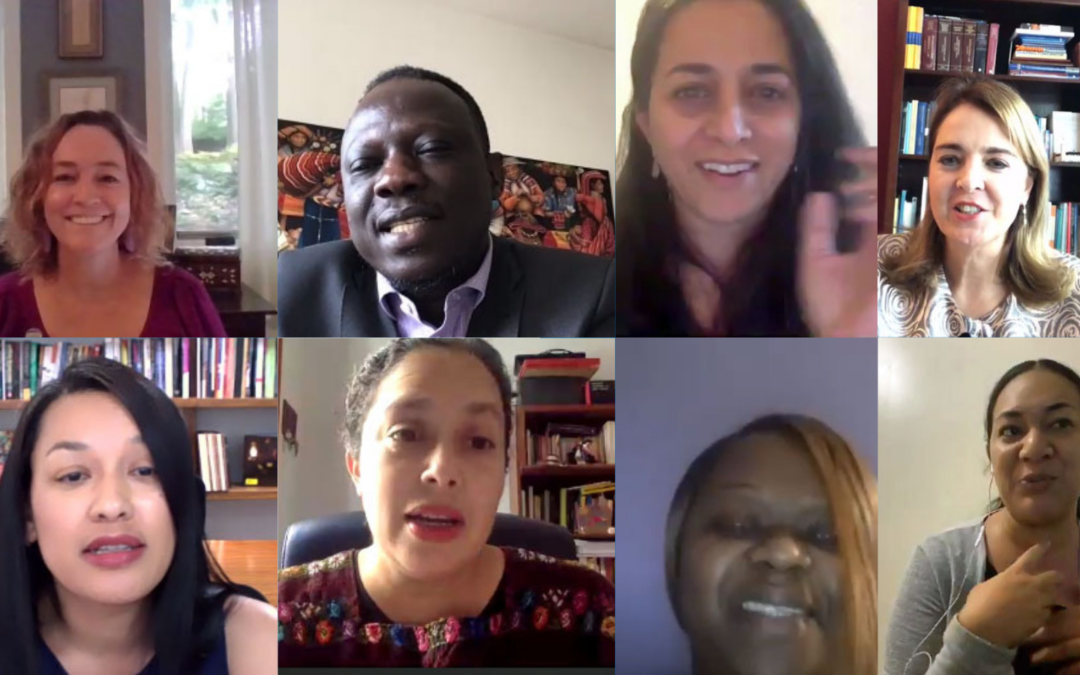
Oct 21, 2020
Even as gender equality and women’s fundamental rights are under attack around the world, women activists and their unions and organizations are standing up to the challenges and pushing back, panelists said yesterday during the launch of a landmark report, “Celebrating Women in Civil Society and Activism” with Clément Voule, United Nations Special Rapporteur on the rights to freedom of peaceful assembly and of association.
“Women around the world are building economic power by exercising freedom of association and assembly,” said Solidarity Center Executive Director Shawna Bader-Blau. “Unions and the right to collective bargaining is one way we fight back.” (Watch the event here.)
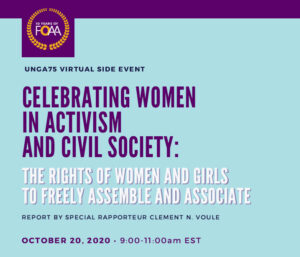 “Courageous women and organizations are pushing back,” said Bahia Tahzib-Lie, Netherlands Ambassador for Human Rights in her opening remarks. “They make clear that women’s voices can no longer be ignored or silenced.”
“Courageous women and organizations are pushing back,” said Bahia Tahzib-Lie, Netherlands Ambassador for Human Rights in her opening remarks. “They make clear that women’s voices can no longer be ignored or silenced.”
The virtual side event, co-sponsored by the Solidarity Center, brought together women civil society leaders from around the world to discuss the findings of the report, prepared by Voule, who is presenting the report to the UN General Assembly this week.
“Women’s organizations and movements and their contribution to activism and civil society continued to be undervalued,” Voule said, highlighting one of the report’s key findings. Their ability to freely form unions and associate is key to their ability to create positive change, according to the report. Yet these rights increasingly are being violated, he said.
“Women are 50 percent of the population” but are often targeted by harassment and other forms of violence when they seek to form unions to improve their workplaces, he said, one of the report’s many findings informed by the experiences of many Solidarity Center partners.
Gender-Based Violence Undermining Women’s Basic Rights
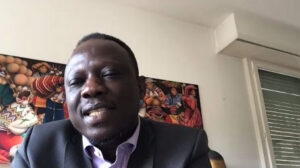
“All forms of gender-based violence and harassment must end,” says UN Special Rapporteur Clément Voule.
Crucially, the report finds that gender-based violence and harassment (GBVH) is “perhaps the fiercest form of reprisal to the exercise of the rights to freedom of peaceful assembly and of association for women workers.”
Gender-based violence begins at home for women and continues to all aspects of public space: “to the streets and the workplace and the public sphere,” said Voule, and COVID-19 lockdowns have worsened the violence women face at home.
The pandemic also has increased the violence women face at work, said Bader-Blau. But a new treaty the International Labor Organization approved last year creates the fundamental right to be free from violence and harassment at work by addressing the root causes of gender-based violence which often also involve race, ethnicity and gender identity.
The treaty, Convention 190, “demands employers and governments make real changes,” she said. “The treaty calls for employers to negotiate directly with workers. No longer can we look at workplace as the private sphere of the employer where workers give up their rights.”

Unions and the right to collective bargaining is one way we fight back”—Shawna Bader-Blau.
Unions and other activists are campaigning for their governments to ratify C190, a difficult process, but one that creates the opportunity for coalition building and cross-movement building among unions, feminist organizations and our allies, said Bader-Blau.
Voule also pointed out how the pandemic has been used to limit the space for civil society, with women especially targeted. “COVID-19 has increased criminalization of women’s rights organizations and harassment against women exercising their rights to peaceful assembly and association with worrisome reports on the misuse of emergency measures, application of criminal laws or limiting public gatherings.”
Progress, Challenges from Beijing +25
This year marks the 25th anniversary of the Fourth World Conference on Women and UN adoption of the Beijing Declaration and Platform for Action on advancing women’s rights, a landmark panelists said should be celebrated, but also reinforced and built upon.

World leaders are now talking about gender equality, but only due to the efforts of grassroots women activists, says Nicolette Naylor.
“Over the last 25 years, we have gone from zero laws, zero resolutions to over 120 laws and resolutions to protect gender equality,” said Nicolette Naylor at the Ford Foundation. “It shows us that progress is possible. This is thanks to women on the ground pushing for change. It’s because of the mobilization of women’s rights organizations and feminists on the ground.”
Making progress on ending gender inequality means involving women and ensuring their voices are heard, according to panelists who reinforced the report’s recommendations that “effective strategies to address violations of women’s rights to freedom of peaceful assembly and association should be grounded in supporting and empowering women’s movements and organizations in all their diversity.”
“Many women on the ground led the way. Now we need to create more space for women to get places they deserve so they can push forward these agendas,” said Mireille Tushiminina from the Cameroon Women’s Peace Movement. “To hold our governments accountable, we need to be part of the conversation. Women are at the forefront and need to be in the conversation.”
Uma Mishra-Newbery at the Women’s March Global moderated the panel, which also included Marusia López from the Mesoamerican Network of Women Human Rights Defenders and Masina Fusi at Her Voice.
Event co-sponsors included Access Now, CIVICUS, Freedom House, Geneva Academy, Iniciativa Mesoamericana de Mujeres Defensoras de Derechos Humanos, International Center for Not-for-Profit Law, Women’s Global March, Women’s Major Group and the World Movement for Democracy.
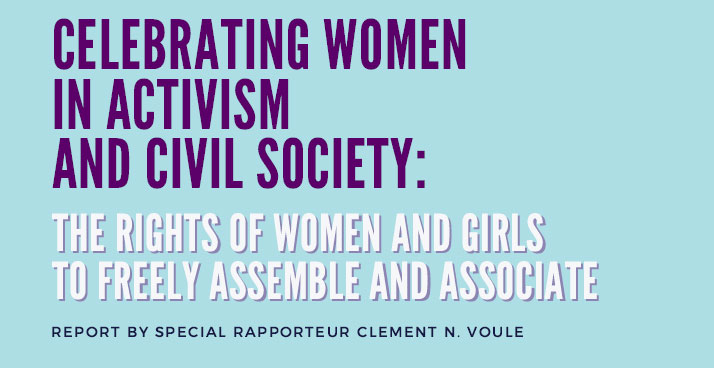
Oct 20, 2020
Women activists and their organizations are the drivers of positive change worldwide—and the freedom to form unions and freely associate is key to their ability to do so, according to a report released today.
“Celebrating Women in Civil Society and Activism,” prepared by Clément Voule, United Nations special rapporteur on the rights to freedom of peaceful assembly and of association, finds these fundamental freedoms empower women to “express their political opinions, engage in … economic and social activities … form and join trade unions and cooperatives, and elect leaders to represent their interests and hold them accountable.”
Yet women’s voices are undervalued, the report states, even as government, employers and others violate women’s rights, with many women experiencing an increase in severe violations of these fundamental freedoms and backlashes against gender equality. Exclusions from labor laws, barriers to forming and joining unions and reprisals for labor organizing leave women with “little leverage to change the conditions that entrench poverty, fuel inequality and limit democracy.”
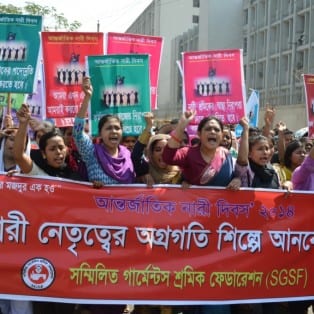
Women’s exclusion from labor laws and reprisals for forming unions in Bangladesh and around the world limit women’s ability to improve their workplaces. Credit: Solidarity Center
For instance in Bangladesh, “in many cases when garment workers want to unionize, they are blacklisted, intimidated, local groups threaten their families and many women are subject to physical assault,” says Nazma Akter, Awaj executive director and president of the Sommilito Garments Sramik Federation (SGSF). “There is no robust legal mechanism to appeal to for the right to organize and to help protect our human rights.”
Women seeking to improve their working conditions face similar challenges around the world, including in Ghana, where women “often are threatened with dismissals or non-renewal of contracts,” say Edward Kareweh, general secretary of the General Agricultural Workers’ Union (GAWU) and GAWU Gender Equality Officer Bashiratu Kamal. “There is a lack of cooperation from government in enforcing laws against discrimination, marginalization and exploitation.”
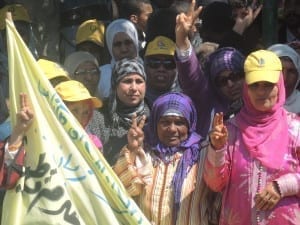
Agricultural workers in Morocco and around the world often are not covered by their countries’ labor laws, a lack of rights that falls especially hard on women. Credit: Solidarity Center/Hind Cherrouk
Laws barring retaliation against women who seek to form unions often are not enforced and additional barriers erected, say women activists.
In El Salvador, “the ability to form and join unions is a constitutional right, but in practice, there are many obstacles, ranging from delay in legal registration, defamatory campaigns, loss of employment, widespread violence, to murder in certain cases, says Marta Zaldaña, Secretary General of the union federation FEASIES.
“Tunisia’s Constitution guarantees equality and equal opportunities for men and women. But despite those important laws, the actual problem is in implementing those laws, especially in the interior regions where male domination prevails,” according to a Tunisian woman union activist.
Nazma, Kareweh, Kamal, Zaldaña and the Tunisian activist were among hundreds of worker rights and human rights activists whose testimony informed the report, which Voule is presenting this week to the UN General Assembly. SGSF, GAWU and FEASIES are Solidarity Center partners.
Gender-Based Violence the ‘Fiercest Form of Reprisal’
The ability of women to freely take action is especially critical now, as the COVID-19 pandemic has worsened the inequalities facing women, in their jobs, homes and communities.
“Faced with narrowing civic space, mounting inequalities and rising fundamentalisms, women have persisted in their fight for structural change, speaking truth to power and building resilience in their communities,” the report states.
Gender-based violence and harassment is “perhaps the fiercest form of reprisal to the exercise of the rights to freedom of peaceful assembly and of association for women workers,” the Special Rapporteur finds.
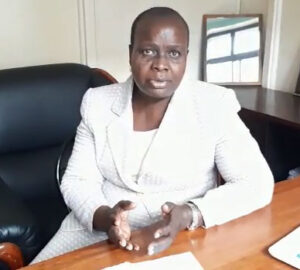
Violence is used as a way of discouraging women from actively participating in unions and seeking leadership positions—Rose Omamo, Metal Workers Union, Kenya. Credit: Solidarity Center
“Gender-based violence against women at work has been on the rise in various places in Kenya. Violence also is used as a way of discouraging women from actively participating in unions/associations and seeking leadership positions,” says Rose Omamo, general secretary of the Amalgamated Union of Kenya Metal Workers, a Solidarity Center partner.
And, when they protest gender-based violence and harassment, women then become targets. “Women workers in Nigeria have been involved in protests against all forms of gender-based, violence and harassment,” says Mercy Okezie, chairperson of the National Women Commission and Nigeria Labor Congress vice president.
“There have been protests against rape and abduction of young girls by terrorists, femicide, sexual harassment in markets and gender-based violence and harassment in the world of work. Some of the women who participated faced … gender-based violence attacks ranging from bullying, sex discrimination to loss of jobs, threats to life and social stigmatization as a result of speaking out or standing up to push for an end to GBVH at home, workplace, their unions and communities.”
Women Must Be Part of the Solution
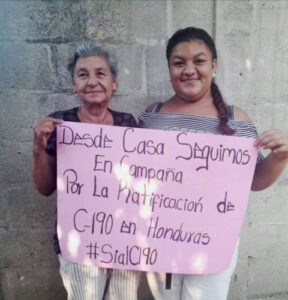
In Honduras, union activists are posting photos of themselves on social media with signs urging passage of C190. Credit: Promotoras Legales
In recommending steps to address violations of women’s rights to freedom of peaceful assembly and association, the report emphasizes the actions “should be grounded in supporting and empowering women’s movements and organizations in all their diversity.”
Governments must ensure adherence to international treaties addressing women’s right to a voice at work and in their communities, Voule said, speaking on a panel today with Solidarity Center Executive Director Shawna Bader-Blau and other civil society leaders. Among its recommendations, the report urges governments ratify International Labor Organization (ILO) Convention 190, which covers gender-based violence and harassment at work, and ILO C189 which recognizes domestic workers’ right at work.
Employers also “have a direct responsibility to respect and protect women’s rights to freedom of peaceful assembly and of association, to act with due diligence to prevent the violations of such rights and to provide women with effective remedies for violations connected to their operations,” the report states.
“Celebrating Women in Civil Society and Activism” builds on the 2016 UN Special Rapporteur report on workers rights that found workers rights—and the freedom to form unions and freely assemble—are key to achieving human rights because without assembly and association rights, workers have little leverage to change the conditions that entrench poverty, fuel inequality and limit democracy.
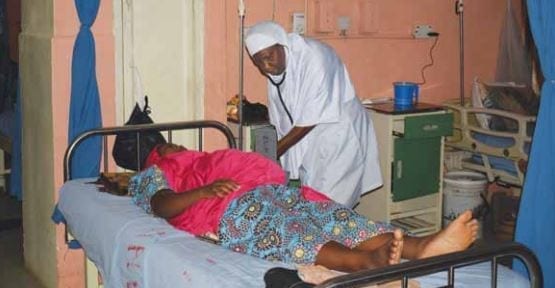
Oct 15, 2020
A new survey of 700 health workers in six West African countries—Gambia, Ghana, Nigeria, Senegal, Sierra Leone and Togo—provides a window into health-sector shortcomings that are compounding the region’s ability to respond effectively to the COVID-19 crisis. The survey, conducted by the Organization of Trade Unions of West Africa (OTUWA) together with national trade union centers and healthcare unions, was released last week together with a raft of union recommendations for ensuring the protection of health worker rights and effective, accessible healthcare for all.
“The results of OTUWA’s health care worker survey are very important for the decision-makers in this region, especially in the midst of a pandemic,” said OTUWA President and National Union of Autonomous Trade Unions of Senegal (UNSAS) General Secretary Mademba Sock.
The survey found that most health workers are being subjected to increased workload without additional compensation and feel unsafe at work due to shortages of personal protective equipment and inadequate access to COVID-19 tests. Respondents indicated insufficient health facilities, shortage of medical personnel and unaffordable medical care as their most pressing issues.
OTUWA, which represents trade union national centers in the 15 West African countries comprising the Economic Community of West African States (ECOWAS), will promote the survey’s findings and policy recommendations within regional organizations such as ECOWAS and the West African Health Organization (WAHO). OTUWA will also support affiliates as they engage their own governments on issues that negatively affect healthcare workers and prevent universal access to good health care.
“The survey findings underscore the fact that workers and unions must be involved in all discussions and decisions about health care systems in our region, so they properly serve everyone’s needs,” said OTUWA Secretary General John Odah, who is urging governments in the region to prioritize and increase budgetary spending on health facilities and supplies.
The survey report was released during an OTUWA-led virtual presentation on October 8, during which Kwasi Adu-Amankwah, International Trade Union Confederation (ITUC)-Africa general secretary, and David Dorkenoo, International Labor Organization (ILO) Bureau for Workers Activities (ACTRAV) specialist for Ghana, Liberia and Sierra Leone, underlined the survey’s importance for policymakers. Other participating organizations in the event included the Organization of African Trade Union Unity (OATUU); Benin, Gambia, Ghana, Mali, Nigeria and Senegal national union centers; and several healthcare unions.
“We are brothers and sisters across these countries, and we have learned a lot from the pandemic,” said West Africa Health Sector Unions’ Network (WAHSUN) Chair Perpetual Ofori-Ampofo, during the event.
At Ofori-Ampofo’s suggestion, event participants agreed that union representatives discussing healthcare issues with their governments should emphasize the urgency of ratifying International Labor Organization (ILO) Convention 190. C190 is the world’s first treaty requiring governments to address gender-based violence and harassment in the world of work, which Ofori-Ampofo said is commonly reported by health workers in the region.
The survey is an activity of OTUWA’s new “Healthcare Is a Human Right” campaign. Launched in Abuja in March, the campaign unites OTUWA affiliates in a fight for equal and fair healthcare access for all who live within the ECOWAS region.
The survey report is also available in French.


 “Courageous women and organizations are pushing back,” said Bahia Tahzib-Lie, Netherlands Ambassador for Human Rights in her opening remarks. “They make clear that women’s voices can no longer be ignored or silenced.”
“Courageous women and organizations are pushing back,” said Bahia Tahzib-Lie, Netherlands Ambassador for Human Rights in her opening remarks. “They make clear that women’s voices can no longer be ignored or silenced.”







